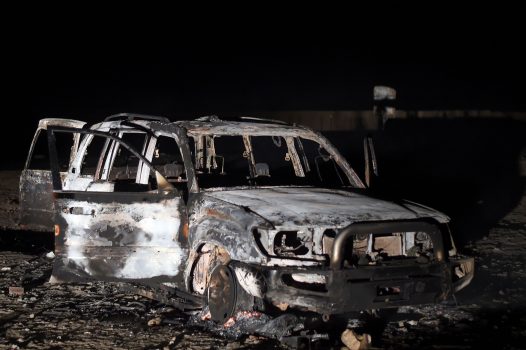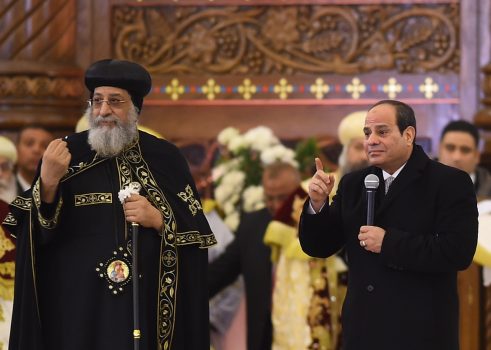

Opinion: Persecution and Hope: Christians in the Middle East Today
With the terrorist group ISIS having lost its caliphate, Western Christians may believe that things are back to normal for their co-religionists in the Middle East. Unfortunately, that is far from the case.
The Vatican’s prefect for the Congregation for Eastern Churches recently sent a letter to bishops around the world as part of an Easter appeal. In it, he explained, “greater cooperation and a generous commitment by Christians all over the world to their brothers and sisters of the Holy Land and the Middle East is needed.”
In addition to routine annual needs, this year, his congregation is helping Iraqi and Syrian Christians who are returning to their homelands after having been driven away, as well as those who are still living as refugees and facing daily persecution for their faith.
The organization Open Doors USA prepares an annual World Watch List(WWL), based on comprehensive research in 150 countries where Christians are persecuted for their faith. The 2019 reporting period (covering Oct. 31, 2017, to Nov. 1, 2018) shows that in the list’s top 50 nations, 245 million Christians experience high levels of persecution.
For reasons of faith, 4,136 Christians were killed in those 50 WWL countries last year. That is roughly 11 each day.
In those countries, 2,625 Christians were detained without trial, arrested, sentenced, and imprisoned, while 1,266 churches or Christian buildings were attacked—that’s about 105 each month.
Eleven countries are identified as “extreme” in their level of persecution of Christians; five years ago, there was only one (North Korea).
This means that last year, Christians were persecuted more than ever before in the modern era, an increase of about 14 percent from the year earlier. That represents 30 million more people abused for their faith.

One of the most upsetting trends noted by Open Doors USA concerns the cruel persecution of women. According to the report, “in many places, they experience a ‘double persecution’—one for being a Christian and one for being a woman. Even in the most restricted circumstances, gender-specific persecution is a key means of destroying the minority Christian community.”
This is particularly true in Islamic nations, where “at least six women every day are raped, sexually harassed or forced into marriage to a Muslim man under the threat of death for their Christian faith.”
In North Korea, where the highest level of persecution has been identified, communism and post-communism oppression are listed as the primary drivers of persecution. For several decades, the nation has idolized the Kim family. Christians are viewed as hostile to that vision, and, for that reason, they need to be eliminated.
Islam, however, is the main reason for the persecution of Christians in seven of the top 10 WWL countries; 34 of the top 50 have majority Muslim populations. In those nations, millions of Christians are treated as second-class citizens, discriminated against, and even subjected to physical violence. Specific issues vary from one nation to another, but the worst persecution takes place in those nations that rule according to Sharia.
After North Korea (and in a virtual tie with it), Afghanistan is the most dangerous country in which to be a Christian. As an Islamic state by constitution, Afghanistan doesn’t tolerate any faith other than Islam. Conversion from Islam is a betrayal not just of faith, but of family, tribe, and country. The common result is a death sentence. Some converts, however, are considered insane (why else would they convert?). They end up in a psychiatric hospital and their property is confiscated or destroyed. With about half of Afghanistan’s 34 provinces ruled or contested by the Taliban, most Afghan Christians are forced into hiding.
Somalia, which ranks third on the WWL, has Sharia law enshrined in the nation’s constitution, and persecution of Christians is particularly violent.
No. 4 on the list, Libya, fell into anarchy after the ouster of dictator Muammar Gaddafi. That left a void that was filled by Islamic militant groups. The persecution of Christians is severe, and they are subjected to violent and degrading treatment.
Pakistan, at No. 5, has strict blasphemy laws that carry the death penalty. Christians live in daily fear over that.
Reasons for Hope
Earlier this year, Pope Francis took a trip to the United Arab Emirates (UAE), becoming the first pontiff to visit an Arab Gulf state. The UAE ranked 45th on the WWL. However, the UAE used the occasion of the papal visit to declare 2019 “the Year of Tolerance,” announce a Festival of Tolerance, establish a new cabinet post for a minister of tolerance, and open a state internet portal on tolerance. Christians have reason for optimism.
Egypt ranks 16th on the WWL, but President Abdel Fattah al-Sisi, at great personal risk, is trying to protect the nation’s Coptic Christians. Copts make up about 10 percent of the Egyptian population. Before al-Sisi, jihadists groups regularly attacked Christians and their churches. Since becoming president in 2014, however, al-Sisi has taken measures such as changing school textbooks to remove content glorifying hatred and violence and limiting such teachings elsewhere. He was the first Egyptian president to attend a Christmas Mass, and he gave a speech at the Coptic Orthodox Christmas service in 2015, in which he called for unity and wished Christians a merry Christmas.

MOHAMED EL-SHAHED/AFP/Getty Images
In Jordan, No. 31 on the list, King Abdullah allows Christians to worship freely. He also protects the right of Jordan’s Christians to build and operate churches, teach the Scriptures, run tours of important Christian holy sites, and operate a seminary. Because of his support, a national park was established on the site where tradition says John the Baptist baptized Jesus. Thirteen different Christian denominations have built churches in the park. Most of them regularly conduct baptisms in the Jordan River.
Even Saudi Arabia has taken significant strides toward religious tolerance. The country has reformed its religious police, responsible for enforcing Sharia law in public and private settings. It also introduced new programs to end extremism.
So, Christians are slowly returning to communities in which their ancestors have worshipped since the first century after Christ. Many of their church buildings are gone, and many threats remain. The return of these Christians to their homeland is based on their determination to live out their beliefs, lives, and traditions in the locations where they feel a deep connection to their roots.
Hopefully, they will be able to work toward reconciliation with their Muslim neighbors. Until that time, they continue to need prayers and support from those who are free to practice their religion.
Ronald J. Rychlak is the Jamie L. Whitten chair in law and government at the University of Mississippi. He is the author of several books, including “Hitler, the War, and the Pope,” “Disinformation” (co-authored with Ion Mihai Pacepa), and “The Persecution and Genocide of Christians in the Middle East” (co-edited with Jane Adolphe).






























